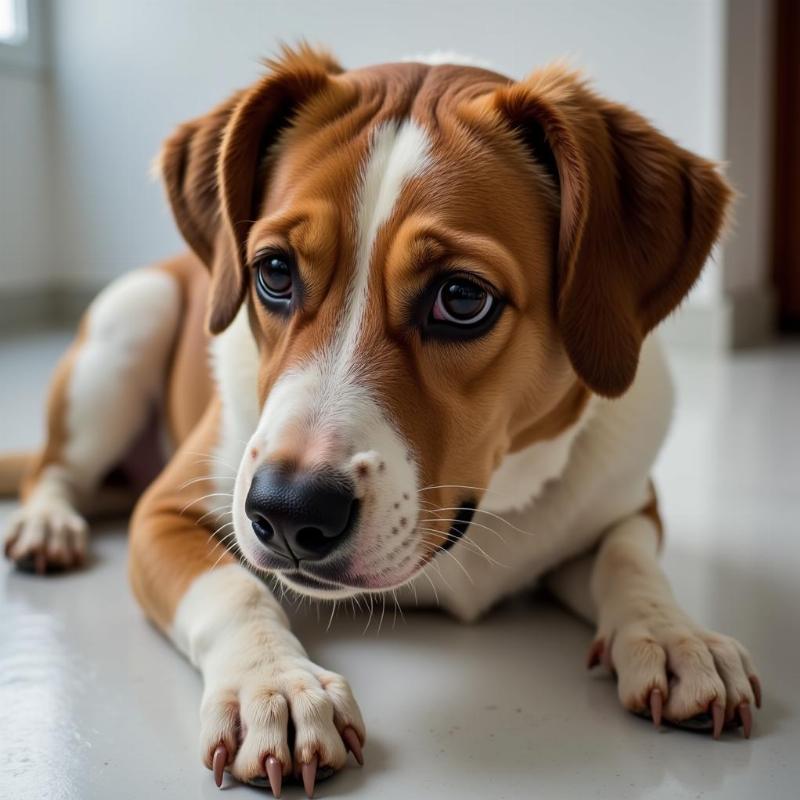Diarrhea after anesthesia in dogs, while generally not a major cause for concern, can be unsettling for pet owners. Understanding why it happens, how to manage it, and what you can do to prevent it will help ensure your furry friend’s comfortable recovery after a procedure. This article covers everything you need to know about diarrhea after anesthesia in dogs, offering practical advice and expert insights to guide you through this common post-operative issue.
Understanding the Link Between Anesthesia and Diarrhea
Several factors can contribute to diarrhea after anesthesia. The medications used during anesthesia can sometimes disrupt the normal gut flora, leading to loose stools. Additionally, the stress of the procedure itself, along with any pre-operative fasting, can also affect the digestive system. Certain underlying health conditions in your dog can also play a role. Finally, post-operative medications, especially antibiotics, can sometimes contribute to diarrhea.
 Dog with Diarrhea After Anesthesia Looking Worried
Dog with Diarrhea After Anesthesia Looking Worried
Recognizing the Symptoms of Post-Anesthesia Diarrhea
The most obvious symptom is loose, watery stools. The frequency of bowel movements might also increase. Other signs could include abdominal discomfort, loss of appetite, and lethargy. It’s essential to differentiate between mild, transient diarrhea and more serious complications.
When to Seek Veterinary Attention
While some mild diarrhea after anesthesia is often self-limiting, there are situations when it’s crucial to contact your veterinarian immediately. If the diarrhea persists for more than 24-48 hours, is bloody, contains mucus, is accompanied by vomiting, or if your dog appears significantly dehydrated or lethargic, seek veterinary care.
Managing Diarrhea After Anesthesia at Home
If your veterinarian determines that the diarrhea is mild, they might recommend some at-home care strategies. Providing a bland diet of boiled chicken and rice can help soothe the digestive system. Ensure your dog has access to fresh water to prevent dehydration. Your veterinarian might also recommend probiotics to help restore the balance of gut bacteria. dog has diarrhea after spay provides more information on post-operative diarrhea in specific situations.
Preventing Diarrhea After Anesthesia
While not all cases of post-anesthesia diarrhea are preventable, some steps can help minimize the risk. Discuss pre-operative fasting protocols with your veterinarian. In some cases, reducing the fasting period might be beneficial. can dogs have water before anesthesia can offer insights into hydration before procedures. Ensuring your dog is adequately hydrated before the procedure is also essential. Probiotics might be recommended in the days leading up to the procedure.
Can stress cause diarrhea in dogs after anesthesia?
Yes, the stress of undergoing anesthesia and a surgical procedure can contribute to digestive upset, including diarrhea.
How long does post-anesthesia diarrhea typically last?
In most cases, mild diarrhea resolves within 24-48 hours. If it persists beyond that, consult your veterinarian.
Minimizing Discomfort and Promoting Recovery
A comfortable and stress-free environment can aid your dog’s recovery. Provide a quiet, clean space where your dog can rest undisturbed. Monitor their bowel movements and food intake closely. diarrhea in dogs after neutering and dog not eating or drinking after spay offer specific advice for common post-operative situations. For longer-term concerns, you can also refer to dog diarrhea 2 weeks after spay.
Conclusion
Diarrhea after anesthesia in dogs is a relatively common occurrence and usually resolves quickly with proper care. By understanding the causes, recognizing the symptoms, and taking appropriate preventive measures, you can help ensure your dog’s comfortable recovery. Always consult your veterinarian if you have any concerns about your dog’s health after anesthesia.
FAQ
- How can I tell if my dog’s diarrhea is serious after anesthesia? Look for blood in the stool, excessive mucus, vomiting, lethargy, and dehydration. If these signs are present, contact your veterinarian immediately.
- What should I feed my dog if they have diarrhea after anesthesia? A bland diet of boiled chicken and rice is often recommended.
- Can I give my dog over-the-counter medication for diarrhea? Never give your dog any medication without consulting your veterinarian.
- Are probiotics helpful for post-anesthesia diarrhea? Probiotics can help restore the balance of gut bacteria and might be beneficial. Consult your vet for recommendations.
- How can I prevent my dog from getting dehydrated if they have diarrhea? Ensure they have access to fresh water at all times.
- When should I call my vet if my dog has diarrhea after anesthesia? If the diarrhea lasts longer than 48 hours, or if other symptoms develop, contact your vet.
- Is it normal for a dog to be lethargic after anesthesia? Some lethargy is normal, but excessive lethargy accompanied by other symptoms warrants a call to the vet.
Beautdogs.us: Your Trusted Partner in Dog Care
Beautdogs.us is a leading dog lifestyle website in the US, offering expert advice on dog breeds, care, and products. We provide comprehensive and reliable information for both novice and experienced dog owners, covering everything from health and nutrition to training and grooming. Beautdogs.us connects dog owners with valuable resources and a passionate community dedicated to providing the best possible care for their canine companions. We are your one-stop destination for all things dog-related, empowering you to make informed decisions about your furry friend’s well-being. Contact us at [email protected] or call us at +1 501-555-7529. Beautdogs.us is here to support you every step of the way.